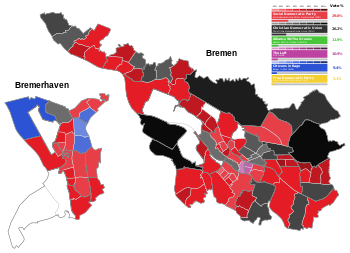You can help expand this article with text translated from the corresponding article in German. (May 2023) Click [show] for important translation instructions.
|
| |||||||||||||||||||||||||||||||||||||||||||||||||||||||||||||||||||||||||||||||||||||
All 87 seats in the Bürgerschaft of Bremen 44 seats needed for a majority | |||||||||||||||||||||||||||||||||||||||||||||||||||||||||||||||||||||||||||||||||||||
|---|---|---|---|---|---|---|---|---|---|---|---|---|---|---|---|---|---|---|---|---|---|---|---|---|---|---|---|---|---|---|---|---|---|---|---|---|---|---|---|---|---|---|---|---|---|---|---|---|---|---|---|---|---|---|---|---|---|---|---|---|---|---|---|---|---|---|---|---|---|---|---|---|---|---|---|---|---|---|---|---|---|---|---|---|---|
| Registered | 460,778 | ||||||||||||||||||||||||||||||||||||||||||||||||||||||||||||||||||||||||||||||||||||
| Turnout | 262,099 (56.9%) | ||||||||||||||||||||||||||||||||||||||||||||||||||||||||||||||||||||||||||||||||||||
| |||||||||||||||||||||||||||||||||||||||||||||||||||||||||||||||||||||||||||||||||||||
 Results by polling precinct. Note: the results in the precincts coloured white have not been added to the map. | |||||||||||||||||||||||||||||||||||||||||||||||||||||||||||||||||||||||||||||||||||||
| |||||||||||||||||||||||||||||||||||||||||||||||||||||||||||||||||||||||||||||||||||||
The 2023 Bremen state election was held on 14 May 2023 to elect the 21st Bürgerschaft of Bremen. Elections to the city councils of Bremen and Bremerhaven, the two municipal entities comprising the state of Bremen, were held simultaneously.[1] The incumbent government was a coalition of the Social Democratic Party (SPD), Alliance 90/The Greens, and The Left led by Mayor Andreas Bovenschulte.
With 30% of the vote, the SPD emerged as the largest party on a modest swing. The opposition Christian Democratic Union (CDU) remained steady on 26% but fell to second place. The Greens suffered a significant decline to 12%, while The Left repeated its 2019 performance of 11%. The right-wing Citizens in Rage (BiW) achieved their best-ever result with 9.4%, benefitting from the absence of the Alternative for Germany (AfD), who were disqualified from running due to internal party disputes. The Free Democratic Party (FDP) narrowly retained their seats with 5.1%.[2][3]
On 25 June, the incumbent governing coalition announced that they would renew their cooperation, forming the Second Bovenschulte senate.
- ^ "State and local elections in the state of Bremen". Elections Bremen (in German). Retrieved 11 February 2023.
- ^ "German Greens suffer setback in Bremen local election". The Guardian. 15 May 2023.
- ^ "Scholz's Social Democrats win Bremen state vote, Greens slump". Reuters. 15 May 2023.





